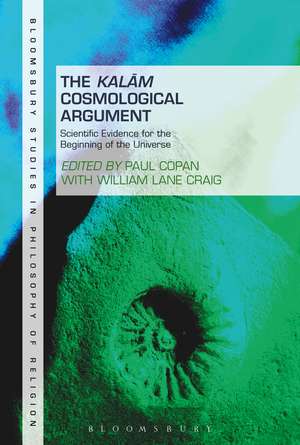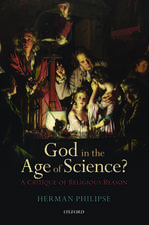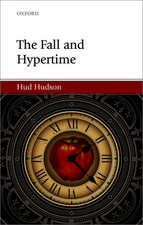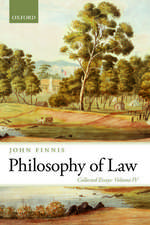The Kalam Cosmological Argument, Volume 2: Scientific Evidence for the Beginning of the Universe: Bloomsbury Studies in Philosophy of Religion
Editat de Professor Paul Copan, Dr William Lane Craigen Limba Engleză Hardback – 15 noi 2017
| Toate formatele și edițiile | Preț | Express |
|---|---|---|
| Paperback (1) | 234.38 lei 6-8 săpt. | |
| Bloomsbury Publishing – 29 mai 2019 | 234.38 lei 6-8 săpt. | |
| Hardback (1) | 718.12 lei 6-8 săpt. | |
| Bloomsbury Publishing – 15 noi 2017 | 718.12 lei 6-8 săpt. |
Din seria Bloomsbury Studies in Philosophy of Religion
- 30%
 Preț: 527.07 lei
Preț: 527.07 lei - 22%
 Preț: 224.66 lei
Preț: 224.66 lei - 19%
 Preț: 191.38 lei
Preț: 191.38 lei - 13%
 Preț: 254.19 lei
Preț: 254.19 lei - 22%
 Preț: 232.90 lei
Preț: 232.90 lei - 12%
 Preț: 234.38 lei
Preț: 234.38 lei -
 Preț: 258.42 lei
Preț: 258.42 lei - 13%
 Preț: 255.84 lei
Preț: 255.84 lei - 13%
 Preț: 224.58 lei
Preț: 224.58 lei - 31%
 Preț: 830.20 lei
Preț: 830.20 lei - 22%
 Preț: 257.50 lei
Preț: 257.50 lei -
 Preț: 257.03 lei
Preț: 257.03 lei -
 Preț: 259.42 lei
Preț: 259.42 lei -
 Preț: 254.93 lei
Preț: 254.93 lei - 21%
 Preț: 216.52 lei
Preț: 216.52 lei - 23%
 Preț: 190.50 lei
Preț: 190.50 lei - 23%
 Preț: 192.30 lei
Preț: 192.30 lei - 23%
 Preț: 191.22 lei
Preț: 191.22 lei
Preț: 718.12 lei
Preț vechi: 1029.76 lei
-30% Nou
Puncte Express: 1077
Preț estimativ în valută:
137.41€ • 143.19$ • 113.78£
137.41€ • 143.19$ • 113.78£
Carte tipărită la comandă
Livrare economică 03-17 aprilie
Preluare comenzi: 021 569.72.76
Specificații
ISBN-13: 9781501335877
ISBN-10: 1501335871
Pagini: 376
Dimensiuni: 152 x 229 mm
Greutate: 0.68 kg
Editura: Bloomsbury Publishing
Colecția Bloomsbury Academic
Seria Bloomsbury Studies in Philosophy of Religion
Locul publicării:New York, United States
ISBN-10: 1501335871
Pagini: 376
Dimensiuni: 152 x 229 mm
Greutate: 0.68 kg
Editura: Bloomsbury Publishing
Colecția Bloomsbury Academic
Seria Bloomsbury Studies in Philosophy of Religion
Locul publicării:New York, United States
Caracteristici
The most detailed and expansive book available on the scientific merits of the kalam cosmological argument
Notă biografică
William Lane Craig is a Professor of Philosophy at Talbot School of Theology and at Houston Baptist University, USA. He has authored or edited over forty books, including Theism, Atheism, and Big Bang Cosmology (1995), God, Time, and Eternity (2001); and God Over All (2016), as well as over 150 articles in journals such as The Journal of Philosophy, American Philosophical Quarterly, Philosophical Studies, Philosophy, and British Journal for Philosophy of Science. Paul Copan is the Pledger Family Chair of Philosophy and Ethics at Palm Beach Atlantic University, USA. His past publications include Creation Out of Nothing: A Biblical, Philosophical, and Scientific Exploration (with William Lane Craig; 2004), The Rationality of Theism (co-edited with with Paul K. Moser; 2003), The Routledge Companion to Philosophy of Religion (co-edited with Chad V. Meister; 2007; 2nd ed. 2012) and Philosophy of Religion: Classic and Contemporary Issues (co-edited with Chad V. Meister; 2007). He has authored and edited several other books and contributed essays and written reviews for journals such as The Review of Metaphysics, Faith and Philosophy, Philosophia Christi, and Trinity Journal.
Cuprins
AcknowledgmentsForewordIntroduction Paul Copan (Palm Beach Atlantic University, USA)Inductive Arguments2.3 The Inductive Argument based on Expansion of the Universe1. The Kalam Cosmological ArgumentWilliam Lane Craig (Talbot School of Theology, USA) and James Sinclair (Warfare Analyst, USA)2. Why the Big Bang Singularity Does Not Help the Kalam Cosmological Argument for TheismJ. Brian Pitts (University of Notre Dame, USA)3. On Non-Singular Spacetimes and the Beginning of the UniverseWilliam Lane Craig (Talbot School of Theology, USA) and James Sinclair (Warfare Analyst, USA)4. The Beginning of the UniverseAlexander Vilenkin (Tufts Institute of Cosmology, USA)2.4 The Inductive Argument based on Thermodynamic Properties of the Universe5. A Dying Universe: The Long-Term Fate and Evolution of Astrophysical ObjectsFred C. Adams (University of Delaware, USA) and Gregory Laughlin (University of California, Santa Cruz, USA)6. Heat Death in Ancient and Modern ThermodynamicsGábor Kutrovátz (Eötvös Loránd University, Hungary)7. Entropy and Eschatology: A Comment on Kutrovátz's Paper "Heat Death in Ancient and Modern Thermodynamics"Milan M. Cirkovic (University of Novi Sad, Serbia)8. The Generalized Second Law Implies a Quantum Singularity TheoremAron C. Wall (Institute for Advanced Study, USA)Part 3. Therefore, the Universe has a Cause 9. Libertarian Agency and the Craig/Grünbaum Debate about Theistic Explanation of the Initial SingularityJ. P. Moreland (Talbot School of Theology, USA)10. Causation and the Logical Impossibility of a Divine CauseQuentin Smith (Western Michigan University, USA)11. Beyond the Big BangWilliam Lane Craig (Talbot School of Theology, USA)PermissionsIndex
Recenzii
The two volumes of Copan's The Kalam Cosmological Argument, without a doubt, constitute an excellent collection of essays that for years to come will be the place to start for those interested in a profound analysis of the problems and merits of the Kalam cosmological argument.
A universe which burst into existence must have a Creator-so says the ancient Argument. It sets the scene for these fascinating, expert writings about the Big Bang and its magnificent consequences.
To a cosmologist, the interesting thing about the beginning of the universe is that no one ordered it. No one tried to make a universe with a beginning, and yet time and again, while seeking to describe our universe, scientists found a cosmic beginning in their models. This volume wrestles with the implications of cosmological theories-the interaction between Craig and Pitt alone is worth the price of admission, as is Vilenkin's commentary on the state of the universe. Highly recommended.
A universe which burst into existence must have a Creator-so says the ancient Argument. It sets the scene for these fascinating, expert writings about the Big Bang and its magnificent consequences.
To a cosmologist, the interesting thing about the beginning of the universe is that no one ordered it. No one tried to make a universe with a beginning, and yet time and again, while seeking to describe our universe, scientists found a cosmic beginning in their models. This volume wrestles with the implications of cosmological theories-the interaction between Craig and Pitt alone is worth the price of admission, as is Vilenkin's commentary on the state of the universe. Highly recommended.













